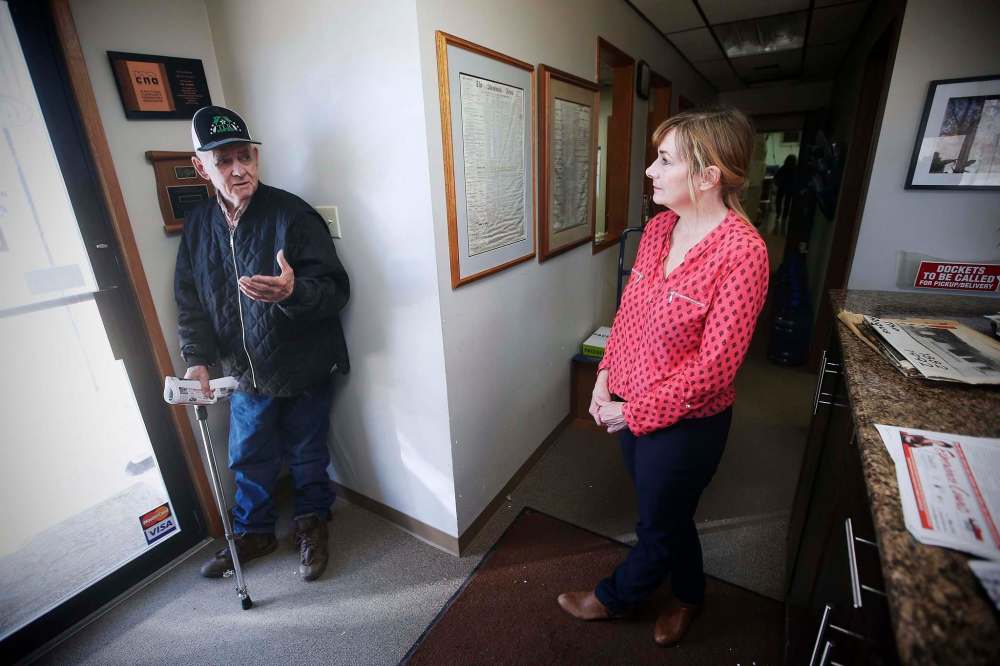The small publisher who is still standing
Ten years ago, Lana Meier started three – now four – weekly newspapers. On Tuesday, her competitor, Postmedia, announced it was folding its community papers
Advertisement
Read this article for free:
or
Already have an account? Log in here »
To continue reading, please subscribe:
Monthly Digital Subscription
$0 for the first 4 weeks*
- Enjoy unlimited reading on winnipegfreepress.com
- Read the E-Edition, our digital replica newspaper
- Access News Break, our award-winning app
- Play interactive puzzles
*No charge for 4 weeks then price increases to the regular rate of $19.00 plus GST every four weeks. Offer available to new and qualified returning subscribers only. Cancel any time.
Monthly Digital Subscription
$4.75/week*
- Enjoy unlimited reading on winnipegfreepress.com
- Read the E-Edition, our digital replica newspaper
- Access News Break, our award-winning app
- Play interactive puzzles
*Billed as $19 plus GST every four weeks. Cancel any time.
To continue reading, please subscribe:
Add Free Press access to your Brandon Sun subscription for only an additional
$1 for the first 4 weeks*
*Your next subscription payment will increase by $1.00 and you will be charged $16.99 plus GST for four weeks. After four weeks, your payment will increase to $23.99 plus GST every four weeks.
Read unlimited articles for free today:
or
Already have an account? Log in here »
Hey there, time traveller!
This article was published 29/04/2020 (2055 days ago), so information in it may no longer be current.
It was New Year’s Day 1967 when Merv Farmer made the biggest purchase of his life.
A little over a decade earlier, he left his home in Balmoral, Man., at 15 years old, heading to Stonewall to look for a job. He changed oil at an automotive shop for half of the day, but the rest of the time, worked at the print shop across the street where the Stonewall Argus and Teulon Times was printed.
He didn’t have any journalistic training, but he quickly gained an appreciation for the local paper: the stories it told, the voices it amplified, and its vast potential as an enterprise. So on New Year’s Day 1967, he bought the 74-year-old paper. A month later, his daughter Lana Meier was born.

A Kindergarten-aged Meier spent afternoons at the office, doing little tasks to help the paper run. By 13, she was retyping articles into the news system, falling for the business much like her dad.
“I loved the smell of ink from a young age,” she said.
Farmer started other publications — the Interlake Spectator and the Selkirk Journal — which blossomed in the 1980s. There were several reporters, and offices in Selkirk, Gimli, Arborg and Lundar opened. Soon, offers began rolling in from national corporations to purchase what had become a bustling news operation.
In 1992, the papers were sold to Quebecor, and Farmer and Meier stayed on. Later in the decade, the company acquired the Carman Valley Leader, the Red River Valley Echo, and the Morden Winkler Times. Eventually, all those papers, plus the Spectator, Journal, and Argus-Times, came under the control of Postmedia Inc.
On Tuesday, Postmedia announced each of those papers will shut down due to decimated advertising revenue during the COVID-19 pandemic. Next week, the papers will publish for the last time. For the Argus-Times, the final edition comes nearly 130 years after its first.
•••
As Postmedia’s announcement was made, Meier was focused on the task at hand: finalizing the weekly editions of the Selkirk Record, the Winkler-Morden Voice, the Stonewall-Teulon Tribune and The Express Weekly News. Tuesday is production day for the four weeklies, which Meier started against steep odds.
In the late 2000s, Sun Media was restructuring its community papers, emphasizing digital coverage. The strategy included increased advertising from national and Winnipeg-based companies, plus syndicated news from elsewhere. Meier felt the plan was a “cookie-cutter” model.
“It was taking the community out of community papers,” she said.
“We haven’t had a big huge cry saying we’re going to really miss the Times. Because we have the Voice, which has done a phenomenal job.”– Winkler Mayor Martin Harder
She resigned, with plans to exit the news industry. But in May 2010, she was asked if she was interested in purchasing Interlake Graphics, the company her father sold in 1989 to his employees. She said yes.
In August, an intriguing idea was floated: why don’t we start a paper of our own? Meier was unsure. She talked to a lawyer, and her parents, before she and two partners launched three free weeklies in three weeks — the Record (18,000 print run), the Voice (15,000) and the Tribune (7,800). The Free Press headline read, “Newspapers dying? Don’t tell this woman.”
If they told her, she didn’t listen. Four years later, she launched the Express to cover Gimli and the Interlake.
Each paper grew, and much like her father’s papers, became a launchpad for careers, while coverage and readership was solid. Today, the Voice and Record have print runs of 15,000; the Tribune and Express print 10,000.
Like the Postmedia papers, Meier’s publications have fallen on hard times. Before COVID-19, there were 22 employees across the four publications; six took voluntary layoffs. Advertising revenue has decreased 80 per cent, and page counts have decreased. The normal ad-editorial ratio was 25/75; it’s now roughly 50/50.
Meier says the publications are poised to withstand the hardships, largely because of their community roots and do-it-all attitude. Meier edits, writes, collates, stuffs fliers and more: every employee is a jack-of-all-trades.
Jo-Anne Procter, who’s been with the Record since the start, spent Tuesday sticking fliers and proofreading. On Wednesday, she and distribution manager Christy Brown delivered 8,000 copies. “I do pretty much whatever (Lana) needs,” Procter said from a gravel road between Stonewall and Balmoral.
While internship programs are cancelled at many publications, the Tribune will have a summer reporter starting May 8. The Record’s intern started Sunday, and wrote a story on a barn fire for the latest issue.
The latest Record features an update on the Interlake-Eastern Regional Health Authority, a story busting COVID-19 myths, coverage of a virtual AGM, a story on high school teachers doing their jobs during the pandemic, and a piece on disability workers in Selkirk trying to get personal protective equipment, among others.

“Local papers cover what doesn’t make national news,” said Ligia Braidotti, who joined the Record in September as a reporter-editor. “It’s always sad to see newspapers closing down, but we have a responsibility and a mission to give the community a voice. We have to keep working hard.”
Winkler Mayor Martin Harder said while the loss of Postmedia’s papers is significant and a bitter reminder of the troubles of the world, in Winkler, the Voice had surpassed the Times in terms of coverage and impact.
“We haven’t had a big huge cry saying we’re going to really miss the Times,” he said. “Because we have the Voice, which has done a phenomenal job.”
For Meier, the Postmedia closures are worth mourning, especially given her personal connection. “These papers are the record keepers,” she said Wednesday. “To lose those titles is very sad.”
She said she might look to expand coverage to make up for the loss, but she didn’t have too much time to consider the future: a story meeting was about to get under way for the next editions.
ben.waldman@freepress.mb.ca

Ben Waldman covers a little bit of everything for the Free Press.
Our newsroom depends on a growing audience of readers to power our journalism. If you are not a paid reader, please consider becoming a subscriber.
Our newsroom depends on its audience of readers to power our journalism. Thank you for your support.




